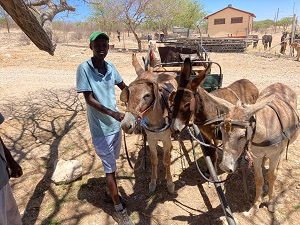
Helping more animals in some of our most rural communities

By Hanna Rhodin
SPCA National Director.
The Society for the Prevention of Cruelty to Animals (SPCA) of Namibia includes the Windhoek Shelter Operations and an additional seven branches throughout Namibia, of various sizes and scopes. They are located in Grootfontein, Keetmanshoop, Luderitz, Oshana, Otjiwarongo, Tsumeb and Walvis Bay.
We are a registered welfare organisation, here to prevent cruelty to animals, and to promote animal welfare in Namibia. Our organization aids animals in need through education, action and provision of care. The SPCA plays a pivotal role in rescuing and assisting animals that are neglected, abandoned and abused all over Namibia. The SPCA’s numerous shelters and foster caregiver networks can house anywhere from about 20 to over 400 animals at any given time.
We are primarily funded by donations from generous private individuals and corporate businesses. The Society for the Protection of Animals Abroad (SPANA) has been the charity for the working animals of the world since 1923, transforming the lives of horses, donkeys, mules, elephants and camels in some of the world’s low-income communities. The charity improves the welfare of working animals by providing free veterinary treatment, training local animal owners and teaching children about animal welfare.
The SPCA is excited to announce one of our latest initiatives to help even more animals in some of our most rural communities. In late 2021, the SPCA Namibia became an official partner of SPANA. Through SPANA’s support, the SPCA has already started this vital work in these three targeted ways, treating, training and teaching.
In October 2021, the SPCA welcomed our latest team member, Veterinarian and Project Coordinator, Dr Jaco Brink and the first Working Animal Welfare field trip took place that very same month. Over the last few months, the SPCA has provided treatment and assisted nearly 200 working animals, mostly donkeys, mules and horses, whose job is to provide transport and conveyance of goods for their humans.
The SPCA has identified three different routes, all starting from Windhoek, that will reach as far as Kamanjab, Tsumkwe and Maltahohe, with several towns in-between. Initially, we expected to reach about 500 working animals per year, but at the current rate, it appears the number will far exceed this.
The SPCA has observed and identified a few key issues in terms of the well-being of the animals, wounds from broken or makeshift harnesses, ill-fitted carts, bits made from wires which injure the moths of the animals, hobbles made from the material which injures the animals, intestinal and external parasites, and wounds and injuries requiring veterinary treatment. Welfare concerns can often be attributed to a lack of resources or knowledge of best practices. There is no veterinarian in many of the towns on the current routes, but even if a veterinarian is available, many owners are unable to utilize their services due to financial constraints.
The project sets out to improve the welfare and lives of working animals through veterinary treatment, providing veterinary care and treatment to prevent and alleviate suffering, and administering vaccines, de-parasitical treatments, wound cleaning and basic information on how to keep working animals as healthy and comfortable as possible.
We will conduct both one on one training and workshops for working animals owners and caretakers. The SPCA will further work with identified Community Champions who will receive skills training and further support, to ensure the project’s sustainability.
We also want to reach children through holistic human education outreach focusing not only on working animal welfare but also on the welfare of pets, farm animals and wildlife. We recognize that the youth of today are the animal guardians of the future.
We are pleased to have received a warm welcome in many of the towns we visited, and we have been happy to be able to provide much-needed services free of charge for working animals in need, thus improving their lives and assisting their owners and caretakers, too.












































